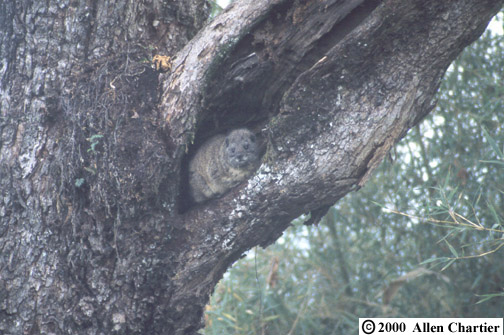
Ethiopian: The tree hyrax inhabits mainly forest areas forming a band across mid-Africa extending from the eastern to the western coast.
Physical Characteristics
Mass: 1 to 5 kg.
This rodent-looking mammal has short ears and legs, thick, soft fur with gray-brown to black colorings. The hyrax has a distinct patch of lighter colored hair on its back which covers a scent gland and bristles when the animal is excited or mating. Typically the tree hyrax is about 1-2.5 feet in length, has a height at the shoulders of 10-12 inches.
Unlike the other species of hyrax, the tree hyrax is a nocturnal forager. It is mainly herbivorous, feeding on leaves, fruits, bark, twigs, and grasses as well as an occasional insect.
Reproduction
The tree hyrax has an unusually long gestation period for its size; ranging from 6.5 to 7.5 months. Sexual maturity is reached around 16 months of age. Litter sizes of 1-2 are common, unlike the larger litters of other hyraxes. The young are born fully furred and rather large. By the age of one day they are competent climbers. There is little data on the mating systems of these animals due to their nocturnal lifestyle, however it is believed that within the small groups there is one dominant male and the rest of the males form bachelor herds.
Behavior
These mammals are nocturnal and usually live a solitary life. There are some exceptions where they live in small family groups. Vocalization is a very important method for transferring information in these animals. They are known for their very loud and piercing contact calls that are generally made after dark when the hyrax is leaving to forage.
Habitat
Tree hyraxes inhabit various regions ranging from wooded areas and savannas to coastal dunes and tropical rainforests.
Biomes: tropical rainforest, tropical deciduous forest, tropical scrub forest, tropical savanna & grasslands.
 tree hyrax |
Family Dendrohyrax dorsalis - (Tree Hyrax) Family Heterohyrax brucei - (Yellow Spotted Hyrax) Family Procavia capensis - (Cape Hyrax)<<<<<<<>>>>>>> ARTIODACTYLA CARNIVORA CETACEA CHIROPTERA DASYUROMORPHIA DERMOPTERA DIDELPHIMORPHI DIPROTODONTIA HYRACOIDEA INSECTIVORA LAGOMORPHA MACROSCELIDEA MICROBIOTHERIA MONOTREMATA NOTORYCTEMORPHIA PAUCITUBERCULATA PERAMELEMORPHIA PERISSODACTYLA PHOLIDOTA PRIMATES PROBOSCIDEA RODENTIA SCANDENTIA SIRENIA TUBULIDENTATA XENARTHRA
Email: eradani7@aol.com